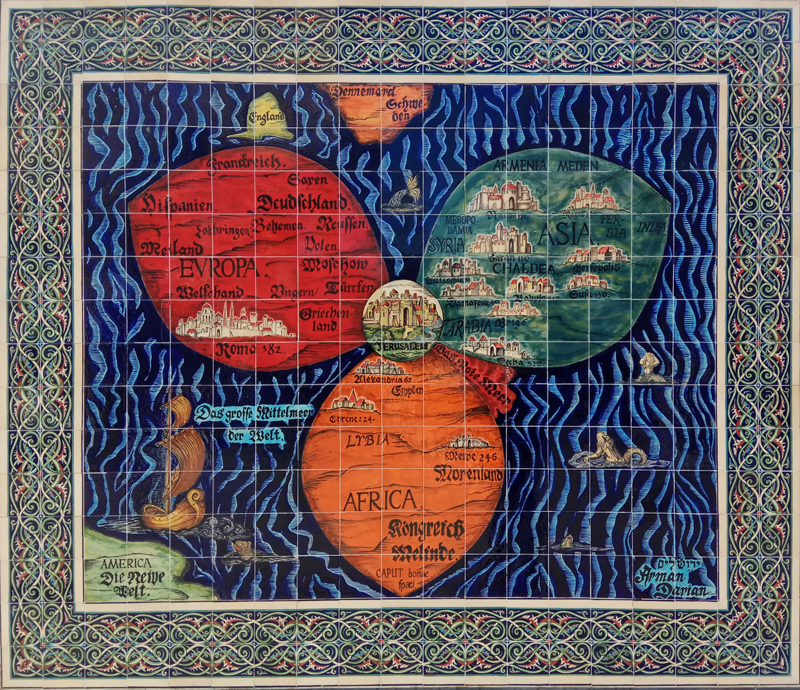
Rabbi Delphine Horvilleur
Over the last few days, I’ve found myself repeatedly thinking about an event I took part in a few years ago in Jerusalem. I’d been invited by the Hebrew University to give a talk to an audience of young Israeli students. They had conscientiously prepared a series of questions for me.
One raised his hand and asked, “How can you be both a religious representative and defend secularism?” Another asked, “How is it possible to be a rabbi as well as a feminist?” A third student came up with the familiar question, “In your opinion, is it possible for Israel to be both a Jewish and a democratic state?”
That was when I held up my hand to stop the barrage of questions so that I could ask one of my own. I wanted my interlocutors to pause for a little self- reflection. I pointed out that they were all asking different variations on the same theme: “Can one be two things at the same time? Is it possible to straddle two different worlds?”
Or to put it in a different way: must our ideological positions always be pitted so simplistically against each other? Or might it be possible to introduce a little complexity into our debates, to escape these one-dimensional interpretations of identity, secularism, feminism, Judaism, and come up with less caricatured expressions of our identities?
I know why I keep coming back to this episode: I hear its constant echo in the discussions about what is happening in Israel. I keep reading articles about how the Jewish state has conquered the democratic state, how Israel has chosen Judaism over liberal values, the Bible and the Talmud over enlightenment and modernity. It makes me want to scream.
This is not to say I don’t see the danger to Israeli democracy. It would be naive not to recognize the phenomenon, the precise mirroring of what is happening in other countries: the rise of nationalism and populism; the obsession with identity; the attack on democratic institutions, the media, the independence of the judiciary, the rights of minorities, and progressive values in general; the nationalist or religious obsession with “pure” or “authentic” identity; the figure of the untouchable leader who speaks in the name of the people in order to strengthen his power and secure his position. None of this is very original, in spite of those who relish the demonization of Israel and like to think its errors and failures are more terrible than those of any other country.
There is no point in trying to persuade those obsessives to see things differently: they will always consider Israel the worst culprit, more immoral and more tainted than anywhere else, even countries that are no less culpable. The truth is that Israel’s nationalist and anti-liberal drift is no more immoral and dangerous than that of anywhere else; to put it another way, it is just as immoral.
The other side of this coin, far more pernicious to my mind, is the implication that the active force behind this enterprise of destabilizing democracy has a name: Judaism. This is what makes me tremble. It enrages me to see Israel’s new government nourish such an aberrant idea, as it goes about boasting of its respect for “authentic and age-old” Jewish values, seeking to establish itself as the guarantor of purity of identity, setting up ministries in its name, delegitimizing the plurality of voices of world Jewry, in order to insist that the only “kosher” recipe is orthodox and messianic, whose aim is to fight gender equality and homosexuality and promote the ethnic supremacy of “Jewish values.”
The Jewish state has not conquered the democratic state—for the simple reason that both sides will be the losers in this current ideological turn. Judaism has been the victim of an ideological kidnapping in the name of messianic-nationalist values that are amputating a part of Judaism—what it once was and what it still has left to say.
The prophet Isaiah declared in the famous adage: “For Zion’s sake I will not be silent”. His voice still resounds today for so many of us, like a sacred injunction. For Zion’s sake, we must speak out.
Of course, I am aware of what makes speaking out so complicated, and sometimes censors our ability to do so. Antisemitism feeds on the image of an ironclad Jewish solidarity, while revelling in the internal disputes of the Jewish people. Obsessive anti-Zionists, always on the lookout for anything that might undermine Israel’s right to exist, instrumentalizes any criticism, all the more so when it is expressed by a “Jewish” voice.
But today I have no choice but to speak out along with all lovers of Israel who feel betrayed and who know that tomorrow they will be accused of being enemies of the project they have loved and nurtured so much.
I have quite a bit of experience of being accused of betrayal or illegitimacy, and some practice at dealing with it. In recent years, I’ve heard again and again that I am a fraud, that my Judaism is not traditional or dogmatic enough to be authentic, that a female rabbi is a contradiction in terms, that my left-wing Zionism, my denunciation of the effects of colonization, and my concern for Palestinian suffering make me at best naïve and irresponsible, at worst a traitor.
And having been frequently attacked by conservative voices I have come to understand what it really is that makes us different: it is not, in the end, our beliefs, our practices, our attachment to tradition, or our concern for the future of the Jewish people. No, it is something more fundamental: our relationship to authenticity.
Often the attack is by someone who is convinced that he represents “true” Judaism, “true” tradition; that he is the legal and accredited representative of a fidelity to history and to past generations, an official delegate of God, our forefathers, and our masters.
In response, I tell him that neither of us can dare to claim such a thing; I no more represent authentic Judaism than he does. Tradition speaks and has always spoken in multiple voices, and history, with all its crises, shocks, and tragedies, has given rise to interpretations that can be complex and even contradictory, but are never illegitimate.
The Book of Esther, a biblical message of diasporic survival and a warning against the abuse of political power, does not offer the same message as the Book of Joshua, with its narrative of military conquest and passion for sovereignty. Both speak different languages from within Judaism, in different contexts and places.
Jewish messianism has given rise in history to the best and the worst, to wonders and catastrophes, to hopes and false prophets. It has been praised or relativized as the nostalgic impulse of a bygone past or a utopian promise of future justice. It has at various moments brought people together or nourished division. It has shown many faces, and emerged in different historical contexts. The strength of Judaism has always been its ability to draw, from its immense library, resources of survival and resilience, and to make these books resonate through the voices of men and women at different times in history. One of the great assets of Judaism is its ability to absorb contradictory voices.
Ben Gvir’s interpretation of Judaism is just one voice, just one language, among so many others. His language is not my Jewish language, it is not the one in which I speak to my children, my students, or my friends, and it is not the one I believe in. Its exclusive and exclusionary message impoverishes and condemns us even as it claims full legitimacy. It must be fought not only by modern democratic means, but also from within the Jewish tradition. It is up to us not to let Zionism or Judaism be kidnapped by those who claim it. It is up to us to fight for democracy in Israel, not against Judaism, but with and through it.
* Isaiah 62,1
Translated by Natasha Lehrer
